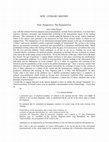Papers by Jerry Aline Flieger

In the with the relation between paranoia and postmodernism, in both fiction and theory, in at le... more In the with the relation between paranoia and postmodernism, in both fiction and theory, in at least three registers: thematic, structural, and transferential (referring to the transactional nature of the reading process). This continuum in turn opens to a fourth realm-the domain of the social, widely construed, which is the context most germane to the discussion on East/ West cultural studies in which we are engaged here. The transparency of our information-saturated global monad, in the age of instantaneous "contact" and access, doubtless confers a paranoid modality to "postmodern" life, giving us the feeling that we are watched everywhere, monitored and transcribed by a ubiquitous information bank. Much postmodern writing reflects this feeling of being under the gaze of an anonymous surveillance-the sense that the ever growing database which catalogues us all has its eye on us, tracking our social and economic history, sometimes for political reasons, sometimes to facilitate the new economic or cultural order (as in the credit rating system in the West). Given the concerns of this age, which Teresa Brennan has termed "the age of paranoia," a raging debate continues to take place concerning the ramifications of this postmodern condition.' Is it a bleak or even psychotic moment, leading to the effacement of the individual and the diminution of social contact? Or is it rather an expansion and recasting of the definition and the possibilities of the social in the global information age? Does it increase contact with otherness-in the spirit of the East/West encounter fostered by the exchange of essays in this volume-or does it efface otherness in a culture of the virtual and the instantaneous, leading to a diminution of productive difference (the meeting, as Terry Eagleton puts it, of Mao with McDonald's)? In other words, what is the status of the global-to use a familiar postmodern marker-and is it conducive to cultural cross-pollination which would go beyond mere commercial exoticism (Thai restaurants in Tucson) or does it disseminate an epidemic of sameness, a culture free of ethics, obedient only to the demands of performance? I would like to suggest that part of the answer depends on how we define the concept "paranoid," as a clinical psychosis, in Freud's sense, or as an episteme, a (postmodern) mode of knowledge. I focus here on 88 NEW LITERARY MISTORY a particular a,pcc, of paranoid modality, its relation to the specular and the visible, an-d h,iice its relation to the Lacanian Imaginary 'node, as adumbrated in his concept of the mirror stage in human development.
Journal of The American Psychoanalytic Association, 2007
Journal of The History of The Behavioral Sciences, 2007
New Literary History, 1997
... term). Unlike their modernist predecessors, postwriters (such as Boris Vian, Siri Hustvedt, L... more ... term). Unlike their modernist predecessors, postwriters (such as Boris Vian, Siri Hustvedt, Luisa Valenzuela, Umberto Eco, Harake Marukami, Italo Calvino) do not just rehearse the vicissitudes of self-referentiality. Rather than ...









Uploads
Papers by Jerry Aline Flieger